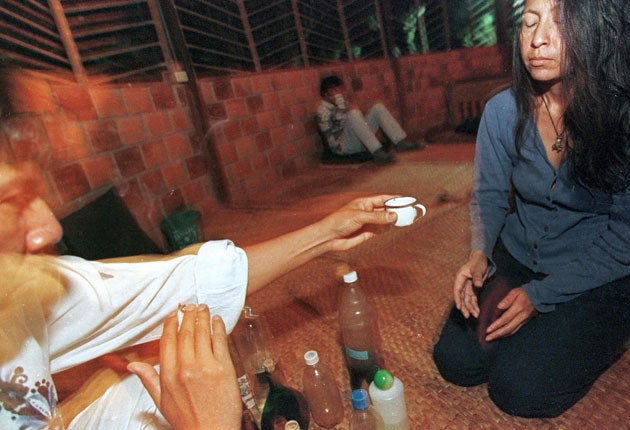Ayahuasca: a shamanic miracle or 'crazy tea'?

By her own admission there aren't many recreational substances that Courtney Love hasn't tried. In a candid interview with the latest issue of the American magazine Fix, the former Hole singer and widow of Kurt Cobain rattled off a long list of her past addictions. But there was one high that even a committed connoisseur like Love hadn't hit.
"The one drug I'd like to try one day is ayahuasca, which should be mandatory for everybody," she said. "It's apparently this crazy tea that gives you these intense hallucinations."
Crazy tea is one way of putting it. A powerful hallucinogenic brew made from rainforest plants, ayahuasca has been used for centuries by indigenous communities in the Amazon in shamanic medicine. The viscous brown liquid is made from a boiled-down mixture of psychotropic plants and is treated with deep reverence by Amazon natives.
But over the years, an increasing number of Westerners have begun to use variations of ayahuasca, either for recreational highs or in therapy centres which offer their own versions of traditional Amazonian medicine.
The ingredient which makes the drink hallucinogenic is dimethyltryptamine (DMT), a naturally occurring psychedelic compound that, in synthesised form, is a Class-A substance. But while DMT itself is banned in Britain, ayahuasca is not, and there has never been a prosecution for its possession or use.
Bags of banisteriopsis caapi vines, the main ingredient for the potion, are freely available for sale on eBay, and a handful of healthcare centres across Europe have sprung up offering ayahuasca treatments openly. The vines themselves contain no DMT. It is only if they are boiled with the leaves of one of two psychotropic plants (also widely available online) that an orally active variant of DMT is produced.
Adherents of ayahuasca credit shamanic medicine for helping them work through emotional traumas and depression which conventional medicine has failed to cure.
In his autobiography Broken Music, the musician Sting recalled how during a tour of Latin America in 1987 he sought out a traditional shaman who helped him grapple with troubling childhood memories.
Writing about his resultant trip, he said: "Closing your eyes transports you to this other world, as real as any other, where sound becomes light and light becomes colour and colour turns into geometry... I am either dreaming awake or I am dead."
But there is concern among health workers that repeated use of ayahuasca could be dangerous, particularly for anyone with mental health issues. The television presenter Bruce Parry, who tried ayahuasca during the filming of his 2008 series Amazon, was shown throwing up in a bucket as he "battled with his ego" during a trip that he described as "at once disappointing, telling and humbling".
The images made compelling viewing, but Parry stressed that Amazonian cultures didn't take hallucinogens in the same way as recreational drug users in the West.
"Ayahuasca is not a recreational pastime," he said. "[It's] a medicine and a spiritual lesson."
The Herbal and Wellbeing Sanctuary in Ticehurst, East Sussex, is one of a handful of health centres in Britain to offer ayahuasca therapies. A spokesperson for the centre said shamanic medicine helped "people extract years of emotional, energetic, psychological and spiritual junk ... as well as to remove all kinds of toxins from their body".
There is no suggestion that any of the centre's therapies are illegal – the spokesperson said it did not boil the vines with psychotropic leaves and had asked both the Department of Health and local police before starting up the business.
The centre, like Parry, was keen to warn against recreational use of ayahuasca. "Our centre attracts people who don't want to go all the way to the Amazon to experience ayahuasca and also people who have come back from the Amazon and have found that they did not really get the healing that they wanted," the spokesperson said.
Celebrity users
Sting The former Police frontman said, "It's not a frivolous pursuit... There's a certain amount of dread attached to taking it – you have a hallucinogenic trip that deals with death and your mortality. It's not something you're going to score and have a great time on."
Paul Simon His song "Spirit Voices" is based on his experiences taking the drug. He said: "We went to see a [shaman] in a shack in a jungle. He chanted these beautiful melodies and then they made up this brew, and they said the anaconda will appear to you ... but no anaconda appeared."
Bruce Parry He took ayahuasca during the filming of the series Amazon. "I was presented with a myriad of spiralling colours and possible wormholes and intriguing places to explore, but as soon as my mind tried to reason with them they receded to a black-and-white untuned TV signal."
Join our commenting forum
Join thought-provoking conversations, follow other Independent readers and see their replies
Comments
Bookmark popover
Removed from bookmarks